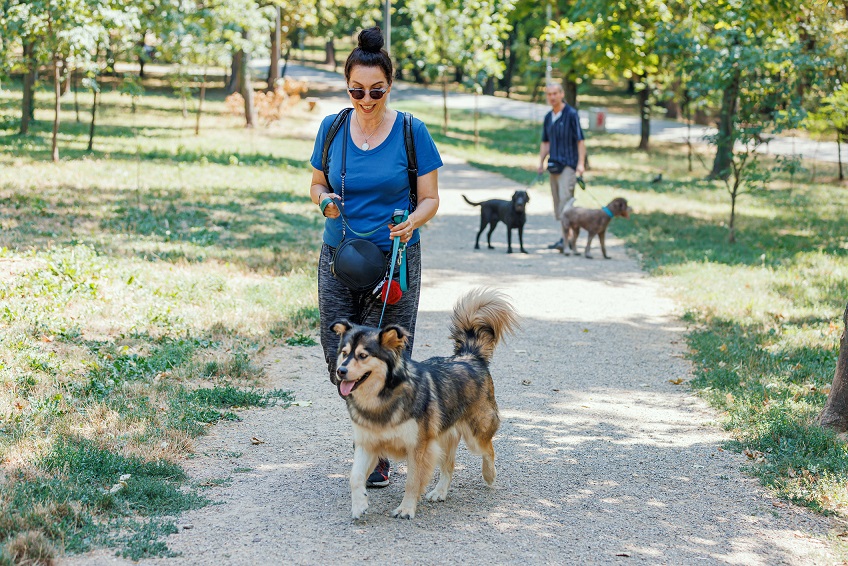Health Unit Raises Awareness About Preventing Dog Bites
Press Release – Leeds, Grenville and Lanark District Health Unit
In 2023, as part of the provinces rabies prevention program, the Leeds, Grenville and Lanark District Health Unit responded to over 500 incidents of people being bitten by animals in Leeds, Grenville and Lanark Counties. This is not unusual with similar numbers occurring every year. A large proportion of these incidents involved dogs and in almost all of these incidents the bite could have been prevented.
In recognizing Dog Bite Prevention Week (April 7-April 13), and in an effort to reduce the number of dog bites each year in the LGL region, the Health Unit wishes to remind residents of steps and strategies to prevent the likelihood of being bitten by a dog. In addition to the risk of exposure to rabies, preventing dog bites reduces the risk potentially very serious injuries as well as reducing the number of hours spent by people in emergency rooms seeking treatment for dog bites.
The first, and possibly most important, thing to remember is that ANY DOG MAY BITE given the appropriate circumstances, even the cuddliest, fuzziest, good natured dog. According to the American Veterinary Medical Association, dogs bite for a variety of reasons, but most commonly as a reaction to something. If the dog finds itself in a stressful situation, it may bite to defend itself or its territory. Dogs can bite because they are scared or have been startled. They can bite because they feel threatened. They can bite to protect something that is valuable to them, like their puppies, their food or a toy. They may also bite because they are not feeling well or are sick or injured.
With these reasons in mind, the Health Unit offers the following precautions to prevent being bitten by a dog:
-
Always ask an owner if it is okay to approach their dog, even if it is on a leash. Don’t just assume the pet is going to be friendly and wanting attention.
-
Try to understand dog body language. Often the signs that a dog may bite are there.
-
Be mindful of touching a dog that is sick or injured as they may bite out of fear or confusion.
-
When meeting a dog who is new to you, do not approach the dog. Let the dog approach you. Offer the back of your hand for the dog to sniff.
-
Never tease dogs by taking their toys, food or treats, or pretending to kick or hit.
-
Never pull a dog’s ears or tail and never climb on or attempt to ride a dog.
-
Leave dogs alone when they are eating or sleeping.
-
NEVER leave children alone with a dog. Young children may not know the necessary precautions to avoid being bitten and may accidentally provoke the dog. A baby or toddler left alone in a room with a dog for even a few seconds could have tragic consequences.
-
If you come across a dog that is loose or unattended, steer clear.
-
If a strange dog approaches you, especially an aggressive one, do not panic and do not run away. Stand still or “be a tree.” Stand still, head lowered and hands clasped in front of you. In a worst-case scenario, if knocked down, curl into a ball and cover your head and neck with your arms.
As a dog owner:
-
Always keep your dog under your control around other people.
-
Ensure anyone who wants to approach your dog does so safely. If you are unsure how your dog will react, ask for people to give your dog its space or move off of a pathway to give your dog space.
-
Remove your dog from situations which it may find stressful.
-
Fence your yard and provide an appropriate sign letting visitors know of a dog on the premises.
It is important to teach children about approaching dogs and safety around your family dog. The Health Unit has created a Dog Bite Awareness resource for parents, those who work with kids to help educate children and also for vet offices and doggie daycares to post for owners. This is able to be printed and posted or you can contact the Health Unit for a copy.
For more information on preventing dog bites and bites from animals in general, please visit the Health Unit website at Preventing Animal Bites - Leeds, Grenville and Lanark District Health Unit or call 1-800-660-5853. You can also connect with @LGLHealthUnit on Facebook and X or @lglhealthunit.z on Instagram.
Contact Us
MUNICIPAL OFFICE
3131 Old Perth Rd
Box 400
Almonte ON, K0A 1A0
Email: Town@mississippimills.ca
Phone: 613-256-2064
HOURS OF OPERATION
Monday to Friday, 8:30 a.m. to 4:30 p.m. except on Statutory Holidays
Sign up to our newsfeed
Stay up to date on the municipality's activities, events, programs and operations by subscribing to our daily news digest

